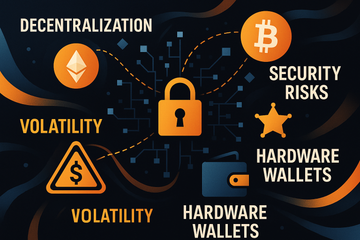Curious about cryptocurrency? Let's be honest, you can't really go anywhere online these days without bumping into it. Whether it flashes across a headline, pops up on your social feed, or comes up while grabbing coffee with friends, crypto is everywhere. But what exactly is it? Why do some folks treat it like digital gold, while others glance at the headlines and just shrug?
The ABCs of Cryptocurrency: What Are We Even Talking About?
Picture money—but without the paper, banks, or central authorities saying, “Hey, this is worth something.” That’s cryptocurrency, a kind of virtual currency using cryptography for security and, maybe more importantly, independence. No banks, no waiting in line, no government telling you it’s payday or not.
Instead, these digital coins or tokens live on something called a blockchain. Think of a blockchain as a shared, electronic notebook that everyone can check and verify, but nobody can erase or fudge. Once a transaction’s recorded, it’s stuck there for good. Back in 2009, when the mysterious Satoshi Nakamoto rolled out Bitcoin, that’s exactly what kicked off this new era.
How It Works: Behind the Digital Scene
Let me explain. Every time you buy or send cryptocurrency, computers all around the world rush to record that transaction. Computers? Yes, thousands of them—this is the heart of decentralization. There’s no main server holding all the cards; it’s a group effort.
People sometimes compare these networks to a big, international co-op. Want to send coins? No problem! Your request goes out, it’s validated by network users (miners or validators, depending on the system), then added to the blockchain for everyone to see. That security? It’s all cryptography—complex math that keeps your coins locked from prying eyes and sticky fingers. More on that a bit later.
The Major Players: A Who’s Who of Crypto
Let’s rattle off a short list, shall we?
- Bitcoin (BTC): The OG, the trailblazer, the name your grandma may have heard. It’s coveted for its limited supply and decentralization.
- Ethereum (ETH): Think of it as the brainy younger sibling. It does more than move coins—it powers smart contracts and whole decentralized apps, the Legos of future finance.
- Others: There are literally thousands, from meme coins like Dogecoin to blockchain platforms like Solana and Cardano. Some have lasting power, others… well, let’s just say you want to do your homework before putting in your hard-earned money.
Why People Love (or Fear) Crypto
Now, here’s where emotions come into play. Why do some people buy crypto and refuse to look back, while others are certain it’s just vaporware? Let’s break down the appeal—and the worries.
- Decentralization: No single point of failure, no stuffy bank hours, no government meddling.
- Privacy and Control: Want to hold your own money without anyone peeking? Crypto puts you in the driver's seat.
- Volatility: Prices swing wildly. Great if you’re lucky (or wise), nerve-wracking if you’re not.
- Borderless Power: Sending money overseas? Crypto ignores borders, no passport required.
- Security Risks: Bad actors love a digital playground. Phishing, scams, and hacks occasionally make headlines.
You know what? It’s a bit like the Wild West. There’s gold in the hills, sure, but you have to look out for bandits and snake oil salesmen.
Hardware Wallets: Your Crypto's Bulletproof Vest
Ever heard horror stories about people losing fortunes because their exchanges got hacked or they forgot a password? Honestly, it’s enough to make anyone sweat. That’s why hardware wallets like Trezor and Ledger are a hot topic. These little gadgets act almost like Fort Knox for your digital assets—you keep your private keys offline, where hackers and malware can’t touch them. It’s simple: if you really care about your stash, you store it yourself, not on some website that could disappear overnight.
Think of it this way. Online accounts are your wallet sticking out of your back pocket in a busy market. A hardware wallet? That’s your cash stashed in a home safe with the key on a string around your neck. Not perfect, but a good deal safer.
Bursting with Trends: What’s Popping in Crypto Culture?
If you were paying attention during 2021, you know the crypto world moves fast. One month, everyone’s trading NFTs (unique digital collectibles, if you missed that memo), and the next, it’s about DeFi—decentralized finance, which aims to rebuild banking from scratch using open-source code tied to blockchains. There are memes, influencers, new coins launched just for fun, and enough debates to fill a year’s worth of podcasts.
This ecosystem is no longer just for the techy crowd either. Institutions? They’re flirting with it. Artists? They’re selling their work straight to fans with NFTs. People from Buenos Aires to Berlin to Bangkok are tuning in, sometimes betting their savings or just a spare lunch.
Risks, Regulation, Reality Checks
Just because something’s new, doesn’t mean it’s foolproof. Crypto has some real wrinkles. Regulation is a puzzle across regions; what’s perfectly legal in Canada might be suspicious in China. Governments are eyeing the scene, sometimes stepping in to protect consumers, and sometimes to protect themselves.
And security? It cuts both ways. The cryptography running under the hood is rock-solid, but no system is stronger than its users. A lost passphrase, a misclick on a phishing email, or trusting the wrong project? Sometimes that’s all it takes.
So... Is Crypto Here to Stay?
Let’s not kid ourselves: no one knows exactly what comes next. But whether it’s people sending money over continents, artists turning pixels into paychecks, or everyday folks hedging against inflation, crypto's here for the ride. It's more than code—it's a cultural phenomenon, a gamble, sometimes a revolution in someone's pocket.
Before you jump in, make sure you really know what you're jumping into. Study, ask questions, maybe chat up that friend who won’t stop talking about their Ledger. Just remember: in the end, the future of money is a story we’re all still writing. And who knows—maybe you're already a character in it.











